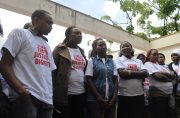PHR advocates for national and international reforms to overcome the political, legal, social, and cultural obstacles that hamper efforts to prosecute perpetrators of sexual violence.
Public Interest Litigation in Kenya
Violence ripped through Kenya in the wake of the 2007 general elections, claiming more than 1,100 lives. Thousands more people were raped or suffered other forms sexual violence – but very few cases were ever prosecuted. In 2013, PHR joined eight survivors of sexual violence and three Kenyan civil society organizations in a landmark lawsuit against the Kenyan government over its alleged failure to protect the victims, investigate and prosecute the crimes committed against them, or provide any reparations.
This high-profile litigation is the only case in Kenya seeking to hold the government accountable for sexual violence in the post-election period. PHR’s team has taken a leading role, working closely with the co-petitioners on strategy and arranging for psychological evaluations for submission to the court. We have also taken a lead in advocacy, helping to shape messaging, galvanizing the media, and developing a strategy to support the survivors’ demands for reparations. This closely-watched case has the potential to spur policy reforms that would improve the medical-legal response to sexual violence, including better care for survivors and forensic documentation to support justice and reparations.
View the Public Interest Litigation resource page here
Standardized Forensic Medical Form
In the Democratic Republic of the Congo (DRC), PHR has advocated for the country-wide adoption of a standardized medical form which we developed with local partners to document evidence of sexual violence. Before the introduction of the form, only a tiny fraction of the thousands of rape cases that occur every year in the DRC were adequately documented. Today, we have created an expansive network of professionals able to produce court admissible evidence using the forensic medical form – and it is making a significant contribution to justice. PHR and our partners used the form to document forensic medical evidence from dozens of little girls in the Kavumu child rape case – evidence which contributed to a landmark verdict of crimes against humanity and life imprisonment for the perpetrators.
Global Advocacy
PHR also contributed to the seminal International Protocol on the Documentation and Investigation of Sexual Violence in Conflict that was issued at the 2014 Global Summit to End Sexual Violence in Conflict. The Protocol provides guidance in best practices on the documentation of sexual violence as a crime under international law.




